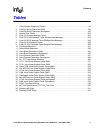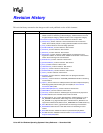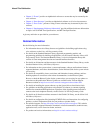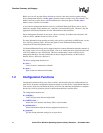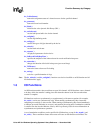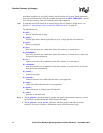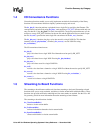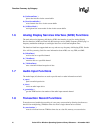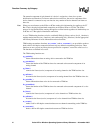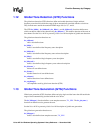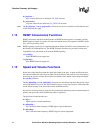
Voice API for Windows Operating Systems Library Reference — November 2003 17
Function Summary by Category
dx_GetRscStatus( )
returns the assignment status of a shared resource for the specified channel
dx_gtsernum( )
returns the board serial number
dx_libinit( )
initializes the voice dynamic link library (DLL)
dx_setchxfercnt( )
sets the bulk queue buffer size for the channel
dx_setdigbuf( )
sets the digit buffering mode
dx_setdigtyp( )
controls the types of digits detected by the device
dx_sethook( )
sets the hook switch state
dx_setparm( )
sets physical parameters for the device
dx_SetRecordNotifyBeepTone( )
specifies the template of the cadenced tone for record notification beep tone
dx_settonelen( )
changes the duration of the built-in beep tone (pre-record beep)
dx_TSFStatus( )
returns the status of tone set file loading
dx_wtring( )
waits for a specified number of rings
Note: The dx_sethook( ) and dx_setdigbuf( ) functions can also be classified as an I/O function and all
I/O characteristics apply.
1.3 I/O Functions
An I/O function transfers data to and from an open, idle channel. All I/O functions cause a channel
to be busy while data transfer is taking place and return the channel to an idle state when data
transfer is complete.
I/O functions can be run synchronously or asynchronously, with some exceptions (for example,
dx_setuio( ) can be run synchronously only). When running synchronously, they return after
completing successfully or after an error. When running asynchronously, they return immediately
to indicate successful initiation (or an error), and continue processing until a termination condition
is satisfied. See the Standard Runtime Library API Programming Guide for more information on
asynchronous and synchronous operation.
A set of termination conditions can be specified for I/O functions, except for dx_stopch( ) and
dx_wink( ). These conditions dictate what events will cause an I/O function to terminate. The



